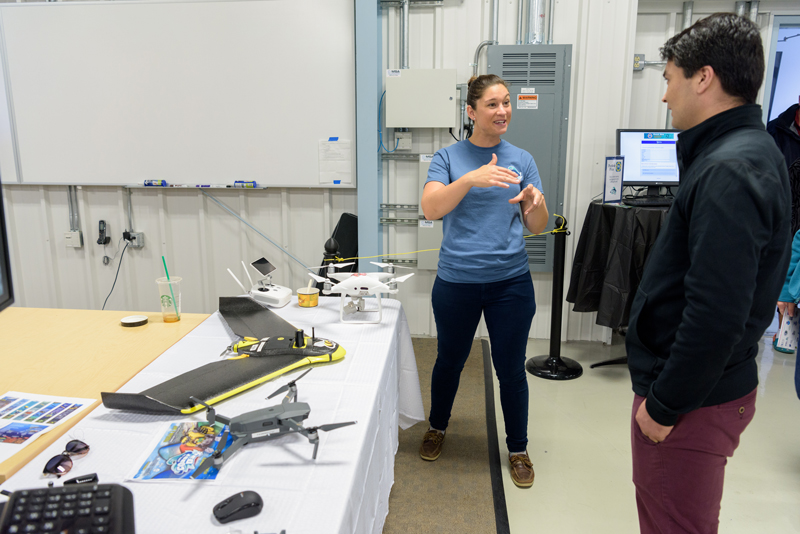


With doctorate in hand, a grad student reflects
Photo by Evan Krape August 24, 2020
UD oceanography program took Stephanie Dohner around the world
As Stephanie Dohner worked toward completing her doctorate in oceanography at the University of Delaware’s College of Earth, Ocean and Environment (CEOE), she reflected on her experience at the University and the positive impact that it had on her.
Q: What made you decide to come to the University of Delaware?
Dohner: Believe it or not, it was a cold advertisement reply. Art Trembanis, [professor in CEOE’s School of Marine Science and Policy] had sent out an advertisement for a graduate student to study coastal storms and to study the coast related to storms in Delaware. I was like, ‘I have never thought about Delaware before,’ but I had just come back from a visit to another University which was just not for me.
At that point, I started going back through my emails trying to find other Ph.D. offers I thought were interesting and the minute I emailed Art, which I think was January, he replied and said, ‘Yeah, your resume looks good’ and someone from the school reached out to me and said ‘Let’s bring you up in February.’ And I said, ‘Alright man.’ That was at the end of 2014 and I came to Delaware in the summer of 2015.
Q: Where did you get your undergraduate degree?
Dohner: Florida Institute of Technology, which is also where I did my master’s.
Q: What’s been your research focus since you’ve been at UD?
Dohner: Everything. It’s convoluted but the thing that ties everything together from a scientific perspective is looking at the question of how can we optimize fieldwork? We do a lot of that through remote sensing, which is using some form of robot. So I would say, the focus itself has been the coastal zone and that’s the marshes and beaches and the shallow water where everybody has a good time. Measuring all that and looking at it as a system. Even though we look at individual parts at one time, we’re trying to piece it all together to try and treat the coastal area as an actual system instead of thinking of it as just waves or just sand.
Q: What sparked your interest in studying the coastal zone?
Dohner: I don’t have any cool backstory where I wanted to do this since I was like four years old. At some point, I was just like, ‘This sounds cool. Let’s do this.’ Obviously, I love the ocean, but I also love the mountains and a lot of that stems from just a challenging environment. Physically and mentally, it challenges you as a person. It’s also super complicated, and I like solving complex problems.
Q: What have been some of your favorite experiences at UD?
Dohner: UD, especially the Robotic Discovery Labs and the campus down in Lewes, we have amazing assets, people that have gone and done wild and crazy things and we do lots of fun things. I’d say my favorite parts were the people. Whether it was professors, students or the interns, everyone surprised me somehow. I’m not usually surprised. I do a lot of planning and thinking, and it takes a lot to outright surprise me. The people were surprising and shocking and then having the sprinkling of things in life that I wasn’t expecting, that’s what was great.
Q: Could you talk about your travel experiences during your time at UD?
Dohner: I got to do a ton. I went to Bermuda for a study abroad with Art and both he and Mark Moline [Director of the School of Marine Science and Policy] in CEOE are super supportive. If you have the initiative, they want you to go out there. So I’ve gone to Italy to work with a lab group that Art did a sabbatical with. I’ve been to Australia to my committee member’s lab and worked with them for a few weeks. I’ve been to Spain for numerical modeling summer school. I went out to the West Coast a few times as well. I’ve done other personal travel but those are the academic related ones.
Q: What has been the most beneficial aspect of your time at UD?
Dohner: I would say, between Art and the other professors, especially Doug Miller [now retired professor in the School of Marine Science and Policy], they’ve allowed me to be very curious in my research. There was some proving time where I had to show that I was capable and responsible enough for different adventures. Whether it was doing outreach events on my own, taking students and teaching them how to do the robotics on my own and those kinds of things, they gave me the freedom but also the feedback. When mistakes happened, and they did, we analyzed it and I learned a lot from it. So for me personally, some freedom to make mistakes but also to do what I was interested in was really important to me, and I found that here.
Contact Us
Have a UDaily story idea?
Contact us at ocm@udel.edu
Members of the press
Contact us at 302-831-NEWS or visit the Media Relations website

